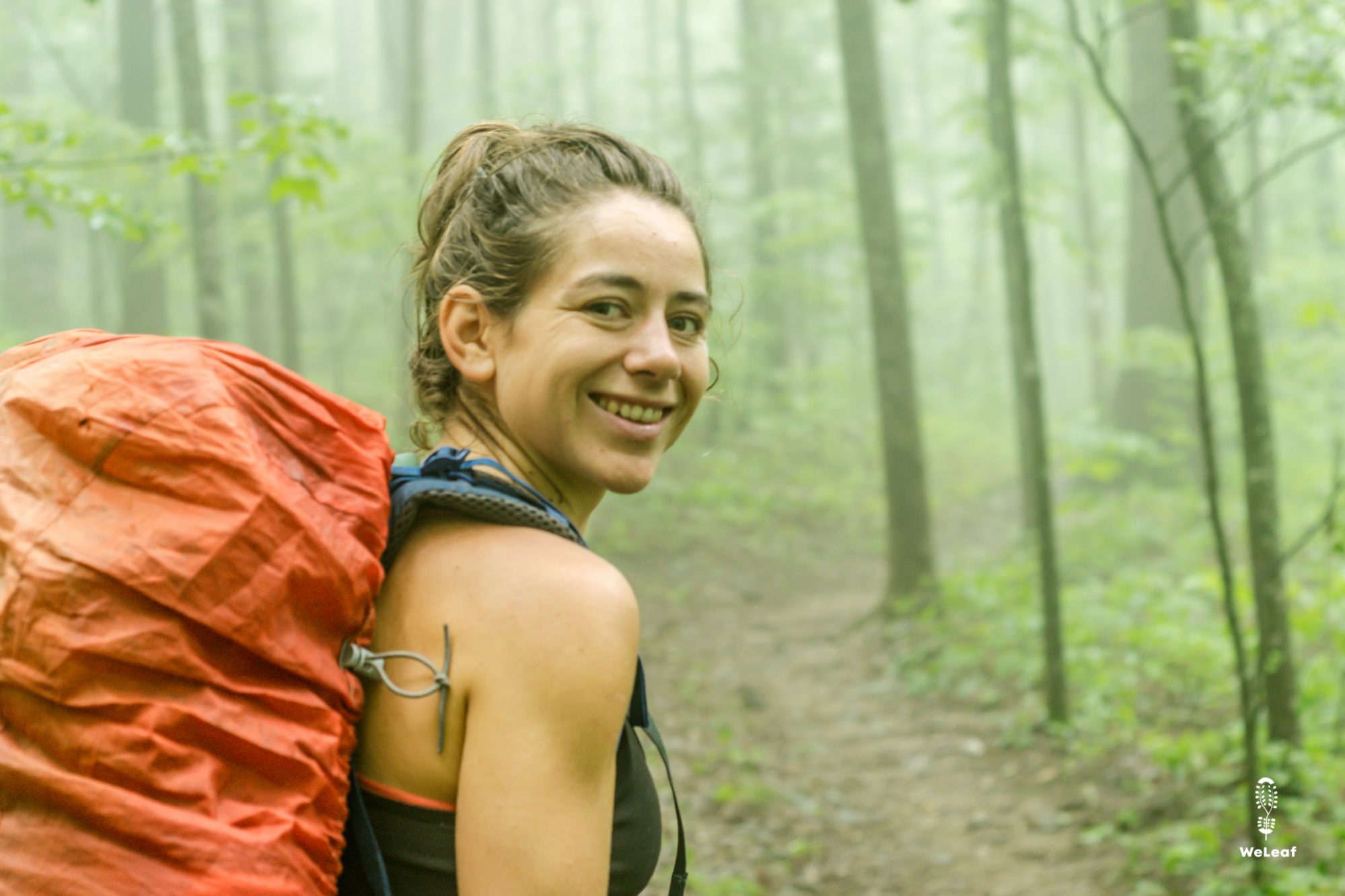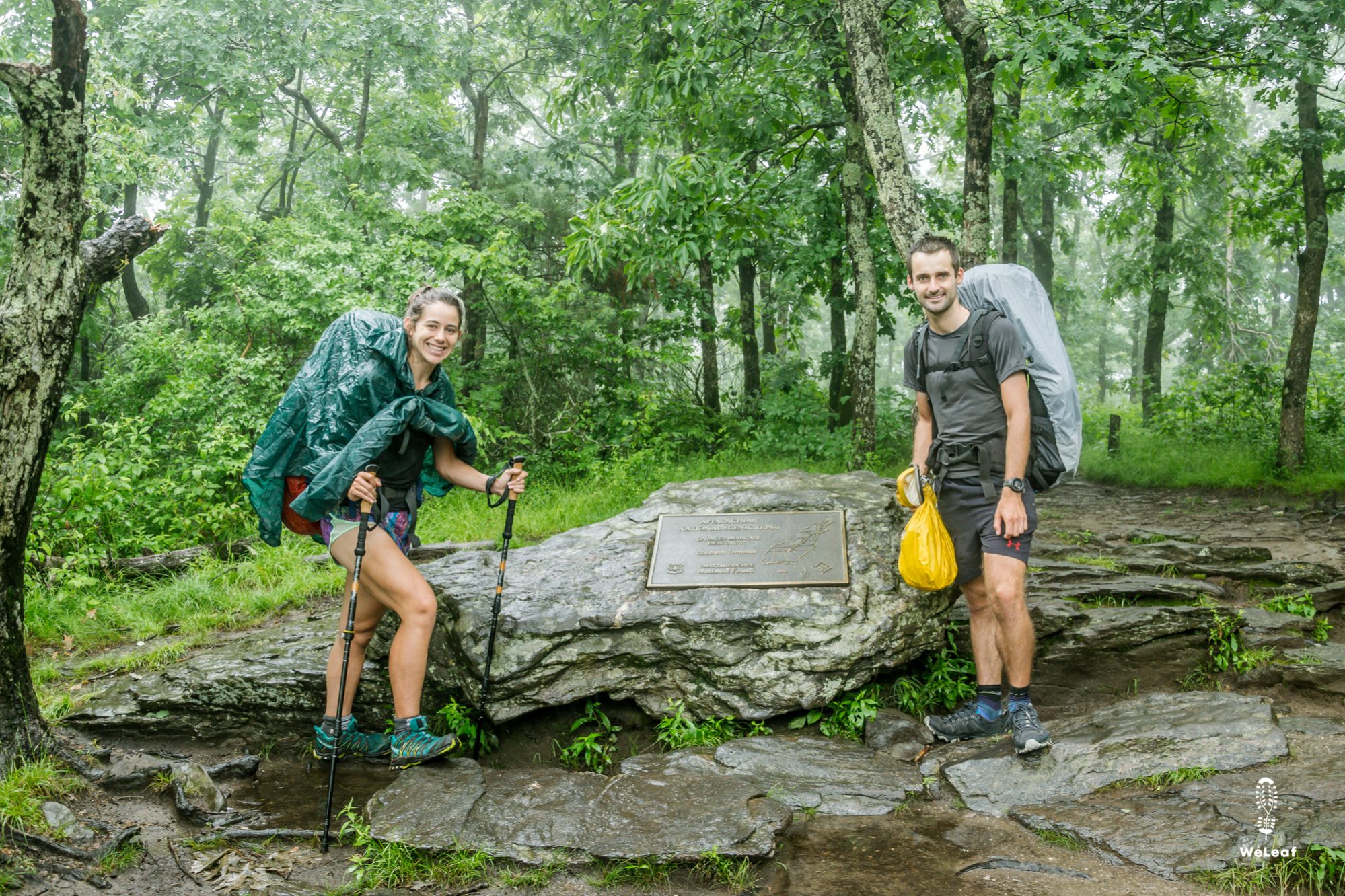
Hiking 1.000 kilometers

Are Americans really fat?
June 6, 2019
Living in the woods
July 26, 2019
Sunday June 9th - North Georgia
We are in the car with Fernando and Novita, our hosts from Atlanta. It's pouring rain as we swing along the mountain roads in northern Georgia. From inside the car it seems to rain extra hard. Nevertheless, we sit in the back seat full of excitement. "Do you already realize it?" Zoë asks. 'Not at all. Mentally I am not prepared at all 'says Olivier, who is happy that he is not nauseous. We are on our way to Springer Mountain, the official start of the Appalachian Trail. Unreachable with public transport and 15 kilometers on unpaved roads. In the back of the car are our backpacks, loaded with the necessary equipment to survive fifty days on the trail. We already travel light on bicycles, but we still had to leave a lot at home and sacrifice, because an extra kilo on the back feels much heavier than a kilo on the bicycle. One set of hiking clothes, one set for afterwards. No room for a hairbrush, a razor blade or shampoo. Olivier even leaves his teddy bear in the panniers. "Sorry Poefie, but 400 grams is a lot," he admitted after much doubt. Our bags still feel heavy. 21 kilograms for Olivier, 15 for Zoë. We do not want to save on healthy food so there are bananas, carrots, onions, sour cream and mushrooms in our bag. "Rather eat one kilo more instead of being hungry," says Olivier. "Indeed, we have no fat reserves to burn."
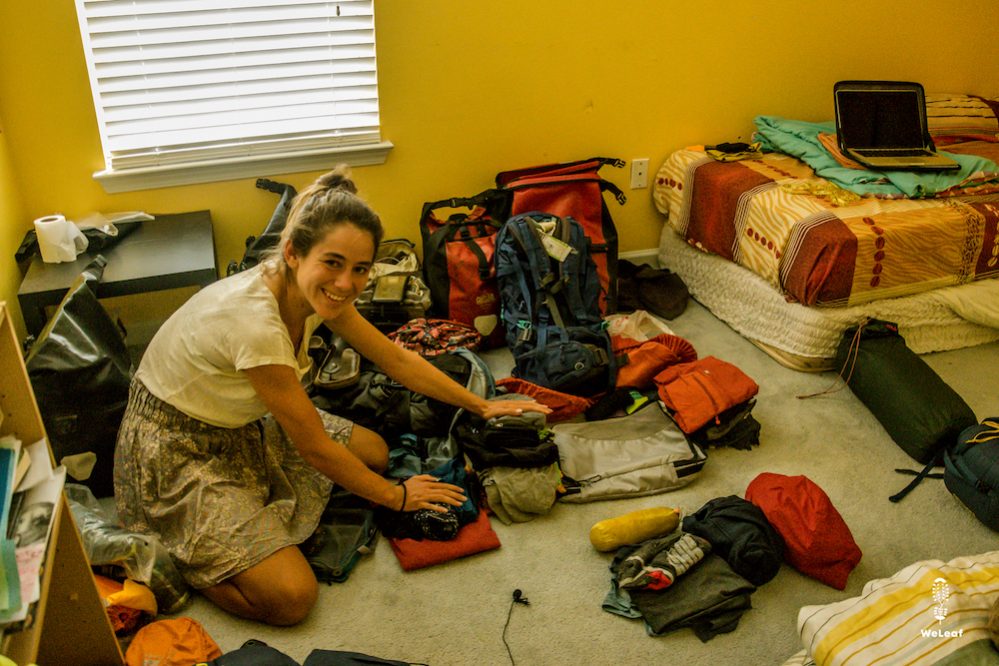
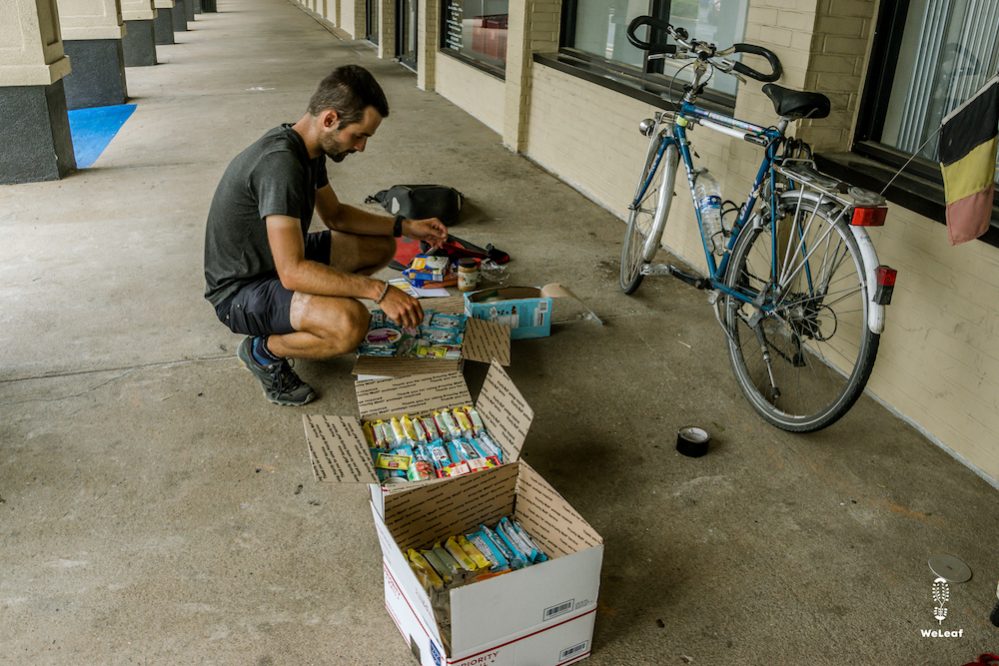
Olivier has explored the entire route. We have to get off the trail every four to five days. Usually we have to hitchhike a few miles into a town. In a few villages there is no supermarket so we have prepared food boxes last week and sent them to an address in the villages. A load of nuts, oatmeal, peanut butter, pasta, wraps, rice, energy bars and much more until the box was full. Let's hope that the packages actually arrive. Five days ago we arrived in Atlanta by bike and now we are already on our way to the start of a 1,000-kilometer walk. No rest, not physically, not mentally, but we are ready for it. Sometimes no time to think is the best preparation. The enthusiasm of a new adventure overcomes any doubt. Even the pouring rain doesn't bother us. “The weather can only get better, right?" Olivier laughs as the drops clatter against the windshield.
Fernando turns into the dirt road and we bump into their, by American standard, small car over the gravel road to the parking lot at Springer Mountain. We are afraid that they will regret their offer to bring us, but they sit in the front seats with a big smile. There are several cars in the parking lot, all large jeeps. 'We are here!' Zoë shouts enthusiastically. Appalachian Trail is written on the information board, but there is no sign that this is the start of a 3,500 kilometer trail. Olivier reads 'Start of the AT, 1 mile south' aloud. 'We first have to walk a kilometer back for the real start. "We do that, right?" he asks Zoë, knowing that she wants to start at the real start, off course. We throw the rain ponchos over the backpack and our head. Olivier still has two bananas in his hand, while Zoë has her hands full with the new walking sticks. "Weird, we're going for a 1,000-kilometer walk," laughs Olivier. "Gosh, that is really far" says Zoë, who realizes what we are going to do. We wave goodbye to Novita and Fernando and disappear to the real start of our quest.
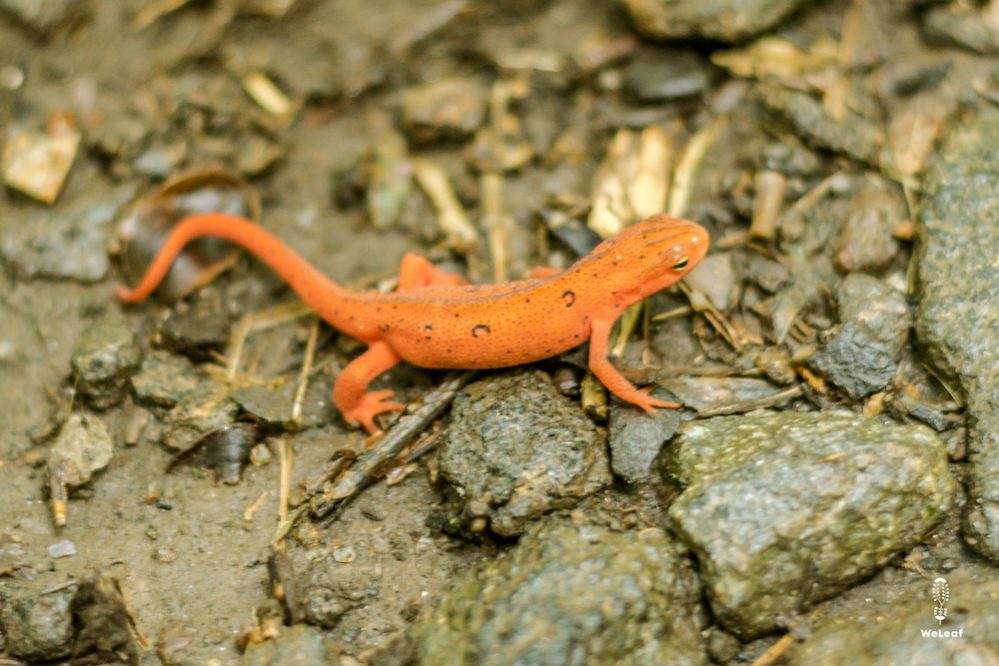
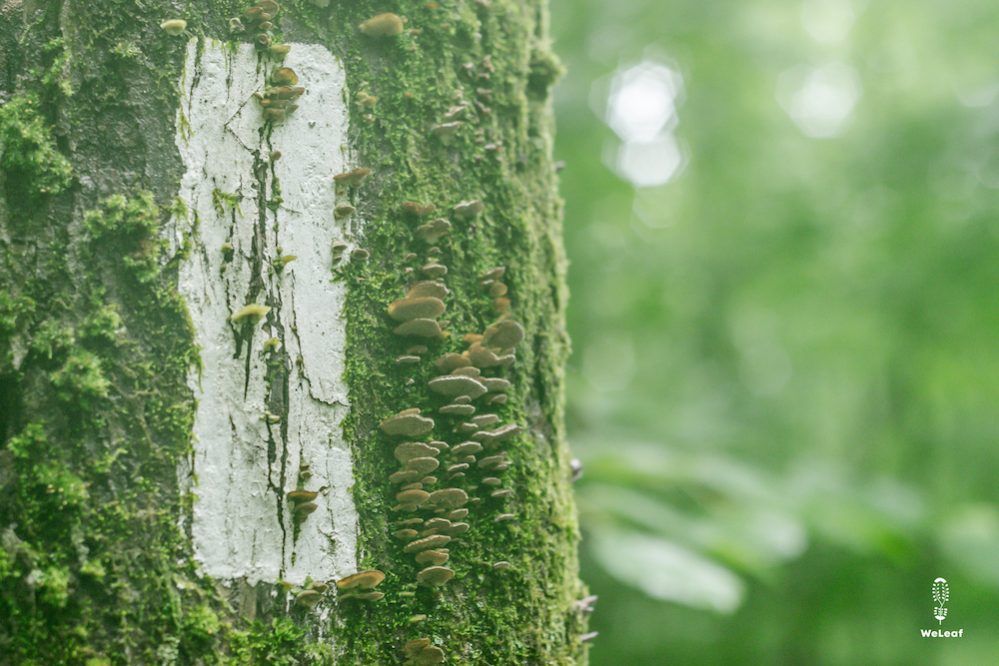
The Appalchian Trail is the best known long distance hiking route in the US. Officially 2,200 miles long, past fourteen states and through different wilderness areas, from Springer Mountain in Georgia to Mount Kathadan in Maine in the northeast. Every year in March and April more than 3,000 hikers start the challenge of a thru-hike that lasts five to six months. A quarter gives up after the first ten days, less than 20% makes it to the end. We do 1,000 kilometers of the trail because after that the 1,200 kilometer long canoe trip is waiting and we only have until the beginning of October when the snow comes in the north. This is our own alternative Appalachian Trail. The entire trail is maintained by volunteers, thousands of volunteers. They remove fallen trees, repair drainage systems, mow overgrown walkways and paint the markings. We follow the 'white blazes', white rectangles painted on the trees. Eighteen centimeters high, six centimeters wide. "There is one there" and Olivier points to a tree on the path. "We must follow those". On the way to the start we meet a father with his daughter, eight years old and she walks with her own backpack and a big smile. They walk five days, about 75 kilometers. "So cool that they do it together!" Zoë says as we walk on. After one mile we arrive at the top of a mountain where a large bronze plate has been worked in the stones. "Springer Mountain, start of the Appalachian Trail." There is a book under the stone and we quickly write our names in it, ensuring that the book does not get too wet. "It's a shame we don't do it completely," says Zoë, who always wants to finish what she's starting to do. 'Let's start with 1,000 kilometers', Olivier winks, who secretly feels the same way.
Under the thick foliage it is not raining so hard at all. The rain capes keep us dry and ventilate well enough so that we don't sweat. From the first meter the trail is very beautiful and completely different from any other hike we have ever done. A path of barely fifty centimeters winds between a green oasis. The sound of raindrops falling on the leaves, birds chattering and no worries about cars and truck traffic. "I can handle this for a few weeks," says Olivier convinced, not yet feeling the weight of the backpack. A few kilometers later we are happy if we can take the backpack off. Olivier reads on the map "Five miles to the shelter." "How much is that in kilometers," Zoë asks, who still has to get used to the miles, pounds, feet and yard. "8 kilometers". 'From now on we will do everything in miles, otherwise I will never learn it' Zoë concludes. We start quietly today with nine miles, but towards the end everything starts to hurt and we count down the miles to the shelter. We don't feel our legs, but the back and feet hurt a lot. "After five days we no longer feel that, just like saddle pain," says Olivier optimistically.
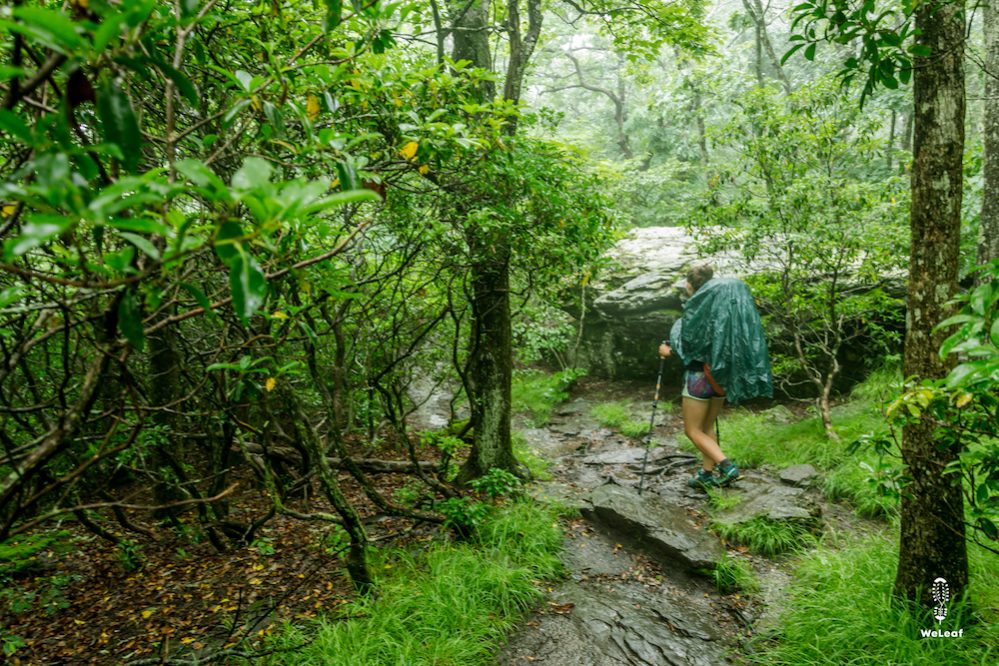
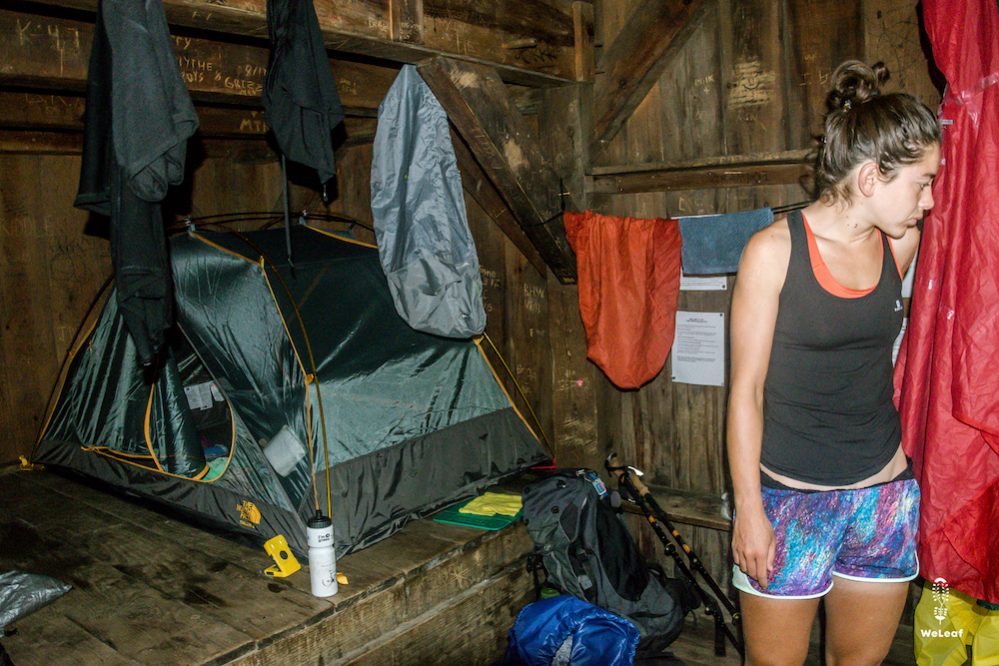
After eight miles there is a 'shelter' sign. There are more than 200 shelters along the Appalachian Trail where you can sleep for free. We have no idea what to expect, but are pleasantly surprised when we see the shelter. It is a wooden building consisting of three walls. Inside are two floors, just big enough to place a dozen sleeping mats. The floor is clean and there is a brush to clean everything. On the wall hangs a plastic case with a large notebook where everyone can write their name and a text. That way you know if a bear is active or if there are mice living in the shelter. Outside the shelter is a large metal box, a bear box to safely store food at night. There are also steel cables to hang the food in the air. A little further is a small wooden construction, the privy. It is the toilet where you flush with leaves. It smells terrible so we prefer nature instead of the stinkhouse. We are all alone in the shelter and do not expect anyone anymore because it is almost six o'clock. It starts to rain harder, apparently we arrived just in time. "Shall we shower in the rain," Zoë suggests. There we are, naked in front of the shelter in the rain, what a pleasure. A few minutes later, in our set of clean clothes, we are in the shelter when another hiker arrives. He is completely soaked and panting as if he had just run a marathon. He can just release 'I am exhausted' and he plops on the wooden bench in the shelter. Fifteen minutes later he is still panting. "He took a lot of hay on his fork on the first day." He sets up his tent and flops down on his mat without washing and eating, knocked out. We cook our pasta with cream, carrots and mushrooms. There is another hiker, who arrived even later, and looks surprised at our meal. The other man crawls straight for a moment, attracted by the nice scent. We empty three bowls, put the food in the bear box and crawl into the tent we have set up inside the shelter. 'How was your day?' Olivier asks, the question he has asked every evening for two and a half years. "The best in recent months!" Zoë smiles.
